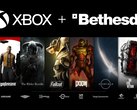CheckMag | Fallout proves that people don't enjoy Bethesda's games, they just enjoy its worlds

The Elder Scrolls and its adoptive-sibling Fallout have certainly proven popular with mainstream audiences for over a decade and a half now, but throughout the years their basic structure has remained remarkably static, with the player crossing wide-open worlds back and forth for a dizzying variety of quests occasionally broken up by clumsy combat and stilted dialogue. This wide-but-shallow design has long been a hallmark of Bethesda's own RPGs, but it was so closely tied to them that from outside it often seemed to be part of the appeal.
Enter: Starfield. Despite the hype and anticipation surrounding BGS's newest franchise, the game's reviews were mixed, at best. Without existing lore and background to draw from, the wide-open planets and their trinkets turned into empty spaces with minimal set dressing; the litany of side-quests no longer provided depth but was merely an exercise in ticking boxes. And once the bottom fell out of the supposed golden formula, all the starship customisation or graphical detail in the Settled Systems weren't enough to bring players back onboard, even if they were both huge leaps over prior games.
On the other hand, the Fallout TV show, set within the same universe as the games, has received strong reviews. Praise for the series has been particularly strong for just how unique the series is; bland post-apocalypses are a dime a dozen in popular culture, but this one is full of wit, dry humour, and ironic subversion of 50s utopian Americana, all washed down with a glass of comically-exaggerated gore. Anyone familiar with the games already knows this picture well (and if you want to get caught up, Amazon are giving away three of them for free on Prime!), but it's pretty notable that the setting's flavour and background has been picked out as a highlight, as they're exactly what was carried over from the PC monitor to the small screen.
Of course, it's easy to dismiss the popularity of the Fallout setting as being down to the Black Isle team that created the franchise and its first few instalments, or maybe their successors at Obsidian Entertainment and their spinoff title Fallout: New Vegas that's considered to be more faithful to the originals. Yet the show, for better or worse, is dominated by notes taken from Bethesda's Fallout titles, and both its visual design and story beats draw heavily from what it established in Fallout 4 in particular. That makes sense – after all, it's Bethesda one working with Amazon to make the show – but the crux of the matter is, whether or not its vision of the IP is untrue to the original intent, that vision is what's proving popular.
So. A Bethesda IP outside of gaming sees success, but a Bethesda RPG without its flagship settings flops. The conclusion to be drawn here, that people enjoy exploring these richly settings more than playing its actual games, is pretty clear... but it's one that might not provide a great outlook for Bethesda Game Studios after a costly flop.
Maybe the swing-and-miss of Starfield is a blip. Maybe The Elder Scrolls VI will be a step forward in innovative and engaging mechanics. But nevertheless, licencing out franchises for the small screen – or even games by third-parties, like the Warhammer Fantasy and 40,000 IPs use to great success – might be quite an attractive source of secondary revenue for BGS and its overlords at Microsoft amid the gaming industry's current downturn.
Source(s)
Own















